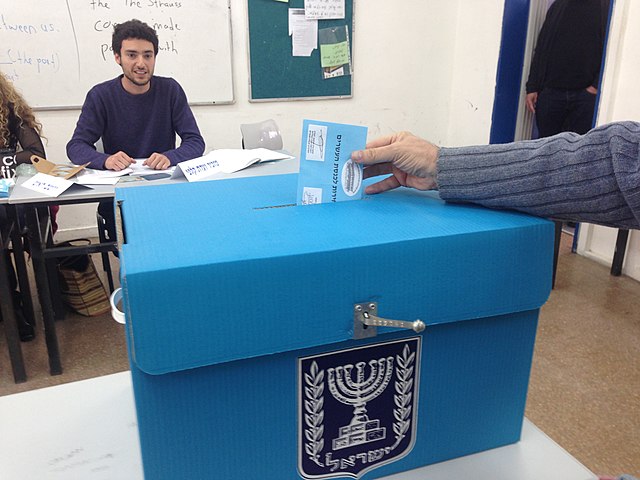FRESH AIR
Parties finalise their lists for next month’s Israeli election
February 5, 2021 | Ahron Shapiro

Registration of parties for Israel’s March 23 national election closed last night, bringing into focus the political battle lines for the upcoming campaign and closing the window for smaller parties to merge and reduce the risk of falling under the electoral threshold of 3.25 percent on Election Day.
This week, several parties that have been polling poorly announced they were withdrawing from the race. On the left, these include: Moshe Ya’alon’s Telem party – a former faction of Blue and White; the “Israelis” party of Tel Aviv Mayor Ron Huldai; and Ofer Shelah’s left-leaning Tnufa party.
Meanwhile, on the right side of politics, Jewish Home party leader Hagit Moshe announced she would have her party sit out the next election and endorse Naftali Bennett’s Yamina party rather than agree to merge with Betzalel Smotrich’s Religious Zionist party. Under pressure from Israeli Prime Minister Binyamin Netanyahu to avoid wasting votes for the right-wing bloc, the Religious Zionist party had earlier made the controversial decision of running together with Itamar Ben-Gvir’s far-right Otzma Yehudit (Jewish Power) party.
Otzma Yehudit’s leaders openly sympathise with the late far-right anti-Arab demagogue Rabbi Meir Kahane. One of them, Michael Ben-Ari, was banned from running for the Knesset in the April 2019 Israeli legislative election over extreme statements he had made, even if Otzma Yehudit’s party platform itself is careful to avoid taking any stance that would lead to their party being disqualified entirely, like Kahane’s Kach was in 1988. To say the party’s support is marginal would be an understatement. In the last election, Otzma Yehudit received under 20,000 votes, a dismal 0.42% of the national vote.
The other major recent development is the division of the Joint List of Arab parties into two entities. The leftist and nationalist Balad, Ta’al and (Jewish-Arab Communist) Hadash will be remaining together and led by Hadash’s Ayman Odeh, while the Islamist Ra’am party, led by Monsour Abbas, will be running on its own.
As in every Israeli election, the new prime minister is determined by his or her ability to form a governing coalition that has the support of a majority of Knesset members – at least 61 out of 120 seats – or the equivalent with support on confidence motions from parties that remain outside of the coalition.
With the party lists now fixed, the battle in this election, even more than the past three previous ones that have been held since April 2019, is over the parties that would be willing to join a coalition led by Likud leader and current PM Binyamin Netanyahu and those that aren’t. Netanyahu is of course currently in the midst of a drawn-out legal trial on corruption allegations.
As the political map stands today, the parties in the pro-Netanyahu bloc, listed in order of size, are the Likud followed by the ultra-Orthodox parties Shas, led by Aryeh Deri and United Torah Judaism, now led by Moshe Gafni and the aforementioned Religious Zionist party – the latter polling close to the electoral threshold.
The parties in the anti-Netanyahu bloc are, in order of size, Yair Lapid’s Yesh Atid party, former Likudnik Gideon Sa’ar’s New Hope, Avigdor Lieberman’s Yisrael Beitenu, the (now reduced) Joint List, the Merav Michaeli-led Labor, Nitzan Horowitz’s Meretz, and Benny Gantz’s Blue and White party – which won 35 seats in April 2019 but split over agreeing to a unity government with Netanyahu last year and the remaining segment is being severely punished by its voters. It might not achieve the threshold to make it into the Knesset next month, according to some polls.
Besides Blue and White, Labor and Meretz have also at times appeared to struggle to get their poll numbers significantly higher than the electoral threshold (though in recent weeks they appear to have solidified adequate votes). Despite the risks, the parties ultimately resisted the pressure to merge in part or in whole, raising the possibility that crucial anti-Netanyahu votes may be wasted if either of these three parties fail to enter the Knesset.
Recent polls are entirely unclear whether Netanyahu is likely to be returned to office, or be replaced or whether the next election will again end in a stalemate where neither side has the numbers to form a coalition. Another election would then need to be called, such as what happened most recently following the election of the 22nd Knesset in September 2019. But after four elections in two years, a majority of election-weary Israelis would almost certainly prefer any other scenario to a fifth ballot.
In future coalition scenarios, the wildcards look to be the previously mentioned Yamina party and Ra’am. Yamina has polled anywhere from ten to 20 seats and has the potential to be the kingmaker in any government given that it has remained carefully ambiguous about whether it would join a Netanyahu-led coalition, even while criticising him strongly. Meanwhile, Ra’am is flirting with the electoral threshold but has recently made headlines by not ruling out coming to some sort of arrangement with Netanyahu in exchange for concrete benefits for Israeli Arab communities, a historically unprecedented stance for an Arab-dominated party in Israel.
The New Economic Party, a niche party focusing on reviving Israel’s economy in the wake of the Covid-19 pandemic, is polling under the electoral threshold but remains in the race and might also be categorised as a wildcard.
Photo credit: Heinrich-Böll-Stiftung, via Wikipedia
RELATED ARTICLES

He survived Bondi. Now he’s fighting back: Arsen Ostrovsky addresses AIPAC conference

US Middle East strategy amid regional instability: Dana Stroul at the Sydney Institute





















